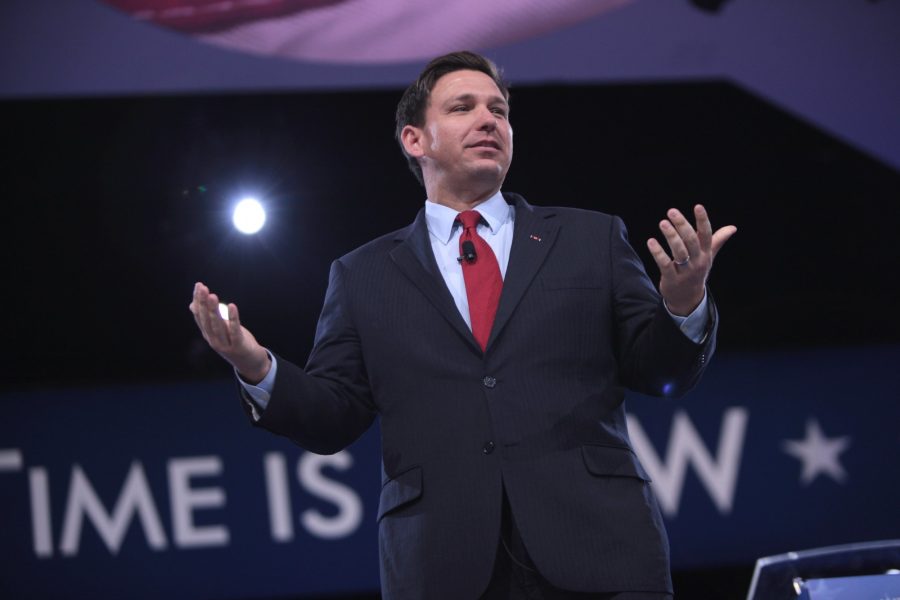“Ron DeSantis” by Gage Skidmore is licensed under CC BY-SA 2.0
The backwards state of Florida dug itself deeper into the ground last month with Republican Gov. Ron DeSantis’ decision to ban Advanced Placement African American Studies from high schools across the state.
This news comes after DeSantis signed into order the Stop W.O.K.E. Act of 2022, in which “W.O.K.E” is an acronym for the “Wrongs to our Kids and Employees.” Such wrongs, in the eyes of Florida’s legislation, include the intricacies of critical race theory from which employees and students are protected under the Stop W.O.K.E. Act.
Critical race theory has been circling public debate across the country. The concept has unfortunately become a politically polarizing fight like almost everything in the United States. It really should be accepted as a fact, though, because, day after day, more instances of the instilled prejudice in American social systems are unveiled.
The AP African American Studies course is set to debut across 60 high schools in the United States with College Board in charge of its implementation. Florida’s education department disrupted the course from being launched on Jan. 12, when they sent a letter to College Board complaining about the validity of the course curriculum and linking their argument to their ignorance of critical race theory.
What is perhaps even more troubling than this DeSantis-led complaint is College Board’s compliance. On Feb. 1, the organization announced the significant watering down they have done to the AP course set to pilot through 2024. The New York Times has identified some of the revisions done to the course as cutting a number of Black figures associated with critical race theory, Black-queer history and feminism.
DeSantis, who has made countless homophobic claims and efforts in his time as governor, defended his argument: “Queer theory. Now, who would say that an important part of Black history is queer theory? That is somebody pushing an agenda on our kids.” Not only is he denying the links between queer history and Black history, but he is recycling this repeated argument against the queer community as an excuse to completely ban African American Studies.
A study done in 2019 by Pulse Opinion Research for U.S. Term Limits concluded that there was a 64% approval rate statewide for DeSantis around the time of his election. Not all Floridians, of course, are cheering for DeSantis like he’s their god however. Fedrick Ingram is a native Floridian and the president of the Florida Education Association and he said DeSantis “believes he was elected to be a king, not the governor.” Ingram said African American studies should be valued in the same manner that Japanese history or music theory are, and “politiciz[ing] African American history is shameful of the governor.”
It turns out that some of those who are protesting DeSantis’ decision are backing their argument with a case close to home. In 2010, Arizona officials banned a Mexican American studies program from making it into Tucson schools until 2017 when a judge ruled it unconstitutional and racist. Despite this feat, “it took seven years of litigation to have that founded,” Nolan Cabrera said. Cabrera is an associate professor in the Center for the Study of Higher Education at the UA and we agreed that the same unconstitutionality and racism applies to the situation rooted in Florida.
On our own campus, there have been multiple instances of racial hostility targeted at Black students within the last year. Last September, Black student Kai Leigh Harriott became one such victim when UA official Maribel Alvarez filed a report with the University of Arizona Police Department against her following a series of troubling events. Harriott defended herself with her own report against Alvarez, but university officials failed to support her. In fact, Harriott said UA Dean of Students Kendal Washington White incited much of the unjustified retaliation against her. She did receive backing from students however, most notably in the form of an October protest led by the Coalition of Black Students and Allies.
I asked Cabrera what he thought students could do to protect themselves and their peers from blatant racism at school. He responded by saying, “I think that’s actually the problem. That, you know, racism is so widespread that it’s almost impossible to isolate yourself from it.” He did, however, stress the importance of advocating for those causes that we believe in. It’s inspiring to see that the student body did exactly that when they showed support for Kai Leigh Harriott in October despite the campus administrators who let her and many of the Black student body down.
People like Ron DeSantis sadly don’t come few and far in between. He is just one elected official representing the majority of a whole state and who knows how many more keeping racism in this country alive. When we see racism occur far away from us, such as in Florida, we must recognize that it can be just as dangerous as nearby. For that reason — and many more — it needs to be called out until it is dispelled from our systems and no longer institutionalized.
Follow the Daily Wildcat on Twitter

Noor Haghighi is a second-year student exploring ways to harness her passions in environmental science and journalism. She loves wildlife photography and portraiture, fashion, music and film.










